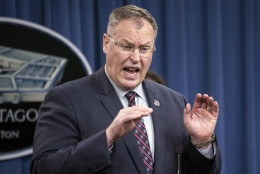Defense Department
-
In one of the busiest weeks yet, the Trump administration gave Congress two budget proposals to debate.
March 16, 2017 -
The Army says it has established a new, streamlined process to approve exemptions from President Donald Trump’s governmentwide hiring freeze, and has now approved about 20,000 new civilian hires, up from just 5,500 waivers the service had issued as of a week ago.
March 15, 2017 -
If you added them all together, the K-12 schools operated by the Defense Department would be one of the nation's biggest districts. That's just one of the services available elsewhere that maybe the military ought to get out of.
March 13, 2017 -
Of the Army’s buildings, 22 percent now meet the Defense Department’s criteria for “poor” or “failing” condition. The service faces a backlog of $10.8 billion in deferred maintenance projects.
March 09, 2017 -
The Pentagon met the letter of the law by turning in a report to Congress on how it plans to implement one of its largest organizational changes in decades.
March 07, 2017 -
The Defense Science Board's latest study on the state of cyber defense in the U.S. reached some worrying conclusions, both for civil infrastructure and for military capability.
March 07, 2017 -
The high paced level of activity this past week centered on the still-sketchy 2018 budget under preparation by the Trump administration. Balancing the big increase the president wants for the Defense Department are cuts averaging 10 percent for civilian agencies.
March 02, 2017 -
In part two of a special report: Defense Acquisition at a Crossroads, Federal News Radio examines the challenges the Defense Department will face as it implements numerous Congressional acquisition reforms, many of which it didn't ask for.
March 01, 2017 -
The Navy has just stood up a new “digital warfare” office, prompted by the notion that the service is awash in valuable, but largely untapped data in areas ranging from acquisition, maintenance and audit readiness to the ways it trains and equips its sailors.
February 24, 2017 -
The Marine Corps is in the midst of a sweeping review of its information technology workforce, the early results of which have confirmed what top officials suspected: many employees’ official position descriptions don’t have much to do with what they actually do for a living.
February 23, 2017 -
Almost exactly four years after the Defense and Veterans Affairs departments decided to go their separate ways in their projects to modernize their electronic health records, DoD’s brand new EHR is now up and running, at least at one base.
February 14, 2017 -
When it comes to defending the country from cyber attack, Defense officials have made abundantly clear that they plan to leverage the military’s National Guard and reserve components as much as possible, including, most recently, by tasking the Army Guard and Reserve to build 21 cyber teams on top of the 133 U.S. Cyber Command had planned as part of its Cyber Mission Force.
February 14, 2017 -
GAO found significant problems in the military’s ability to track its own weaknesses both at the level of the individual military services and at the level of the Pentagon’s comptroller.
February 14, 2017 -
Lawmakers introduced five bills to ensure the readiness of the federal workforce in the face of the hiring freeze or potential furloughs.
February 13, 2017 -
Many federal employees still wonder what direction their agency will head with Donald Trump in the White House - including DoD. Dr. Nora Bensahel and Retired Lt. General David Barno, from the School of International Service at American University, spoke to Eric White on Federal Drive with Tom Temin to provide an analysis of what's ahead for the Pentagon.
February 10, 2017















